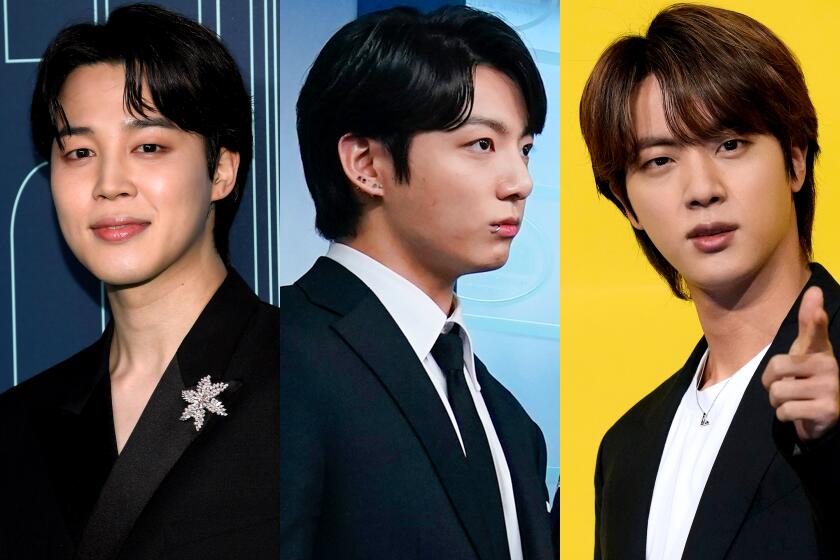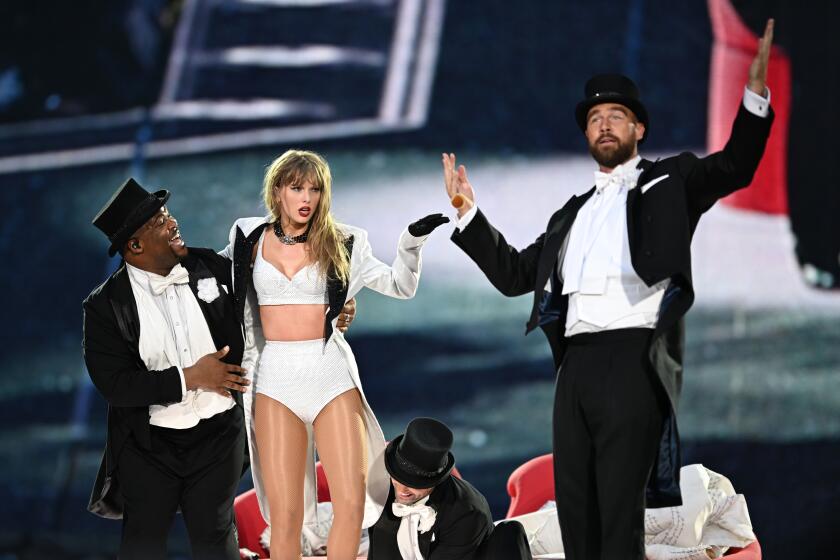Azure Ray Makes a Quiet Entrance
When Moby had the duo Azure Ray come to his New York home studio to sing on his recent “18” album, all was fine except for one thing.
“They are the nicest people in the world,” he says of Orenda Fink and Maria Taylor. “The only difficulty in working with them is that they sing so quietly I had to use a very special microphone specifically designed for really quiet sounds.”
Taylor laughs when she’s told of Moby’s comment.
“He just had this one microphone for us,” she says. “Orenda and I had to stand close together and sing in his tiny apartment.”
But they do sing very quietly regardless of the circumstances. On their two albums and one EP, their voices are hushed, sounding as if they’re whispering right into your ear.
Combined with spare, haunting music and sad, personal lyrics, it’s a highly intimate experience.
“I guess it’s just an aesthetic choice,” Taylor says. “Just the songs and melodies and words, it never would have crossed our minds to sing it loud. We’re singing almost like secrets.”
The secrets are starting to get out. In addition to co-writing and singing “Great Escape” on Moby’s album, Azure Ray will be the opening act for the electronica star, joining his tour Sunday in Dallas. They’ve also become valuable utility players on the burgeoning indie-rock scene in Omaha, where they have just relocated from Athens, Ga. They’ll be performing with Omaha band Bright Eyes and its spinoff, Now It’s Overhead, on summer and fall tours, serving as band members and opening the shows as Azure Ray.
Not that Taylor and Fink, both 26, are expecting an onslaught of attention.
“So far nothing’s changed,” Fink says. “The phone’s not ringing. This is the first interview I’ve done since the [Moby] album came out.... And it’s funny to read on Moby’s Web board how many people don’t realize that he didn’t write the song. And how many people think that Sinead O’Connor sings it. I’ve even read that in magazines. But I don’t care.”
The fact is, Azure Ray’s existence has been as low-key and personal as the music. The two have been making music together since they met in high school in Birmingham, Ala. They eventually formed a band, Little Red Rocket, which in 1997 released one album on independent Tim/Kerr Records before Geffen Records signed them. But roster trimming in the wake of corporate mergers led to the band’s being dropped before it made an album for the company. Moving to Athens, they soldiered on, recording a second album that was released in 2000 on another indie label, Monolyth.
“Then our emotional states took a turn,” Fink says. “It was a lot of personal stuff. We both went through different situations where we had our hearts destroyed for the first time. And while we were writing and playing this pop music that was fun, we were also sitting in our rooms by ourselves writing these really sad songs on acoustic guitar and playing them for each other behind closed doors.”
They didn’t intend to take this music public, but when they finally did last year, the response was enthusiastic. Brian Causey, owner of the tiny Athens label Warm, offered to release their music, with Eric Bachmann (of the bands Archers of Loaf and Crooked Fingers) stepping in as producer and crafting the music’s distinctive atmospheres. The debut album, “Azure Ray,” was released in late 2001.
“When it came out, it really seemed to hit the forefront for us, and we decided this is where we’re at anyway, so we broke up Little Red Rocket,” Fink says.
Earlier this year, Omaha label Saddle Creek Records released the EP “November,” and last month Warm followed it with the album “Burn and Shiver.” Sales haven’t been huge--about 5,000 for the first album and 4,000 so far for the new one--but Fink and Taylor are content with the state of their career. The exposure from the Moby tour stands to broaden their audience. And the move to Omaha (home of Fink’s boyfriend, Todd Baechle, singer in the band the Faint) has cemented their place in a supportive music community.
“We’re not that sad anymore,” says Fink.
Will that affect the music?
“I don’t want to get into the thing where we have to play only sad music and conjure up those emotions,” she says. “It will be changing.”
More to Read
The biggest entertainment stories
Get our big stories about Hollywood, film, television, music, arts, culture and more right in your inbox as soon as they publish.
You may occasionally receive promotional content from the Los Angeles Times.






